The revelations of David Beckham’s documentary: His depression, his obsession with cleanliness and why Victoria wasn’t happy in Spain
The former soccer player just premiered a four-episode series on Netflix in which he goes over his career and life; a story marked by self-demand and media pressure
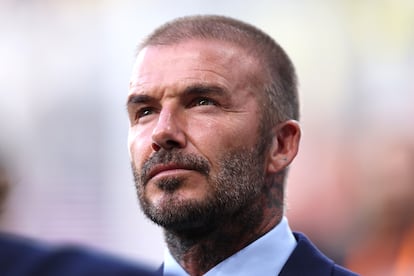
A man appears on screen, his back to the camera. He is dressed as a beekeeper. He could be any enthusiast of the production of honey, but his neck tattoos give him away: he is David Beckham. Thus begins the documentary series in which the former soccer player, at 48 years old, decided to examine his own story. So much has been written and discussed about his professional career and his private life, that one would not think there could be anything left to find out, but the four episodes of just over an hour each (premiered on Wednesday, October 4 on Netflix), prove the opposite – especially because much of what has been written and discussed did not come directly from the source.
The revelations are told by the protagonist, looking straight at the camera; but also by his wife, Victoria Beckham, an essential part of the story of the former captain of the English team. One’s life cannot be understood without the other’s, and both have become an essential part of the pop culture of recent decades. As Anna Wintour says in the simply titled Beckham: “When you have two equally charismatic people, it doubles the volume, it puts the heat factor way up.”
His childhood, his beginnings at Manchester United, how his love story with Posh Spice began, why Victoria Beckham never liked living in Spain, those headlines about cheating... it is a story filled with photos and videos from his personal archives, as well as the statements of David Beckham’s parents and some essential figures from his career, such as Sir Alex Ferguson, Eric Cantona, Gary Neville, Roberto Carlos, Ronaldo, Figo and Florentino Pérez. Yes, there is a lot about soccer. But you don’t have to like this sport to know who David Beckham is, and if this series proves anything, it is that the public’s interest in him goes far beyond his role as a successful athlete. These are some of the most revealing parts of the documentary series directed by Fisher Stevens, the winner of an Oscar for Best Documentary in 2010 (although today he is best known for his role as Hugo Baker in Succession).
His childhood
“Be honest – what car did your dad drive you to school in?” David Beckham asks his wife from the door as she states that they both come from humble origins and working class families. She is reluctant, but he asks her several times, wanting to show that she is not being entirely sincere. “A Rolls Royce,” the former Spice finally says.
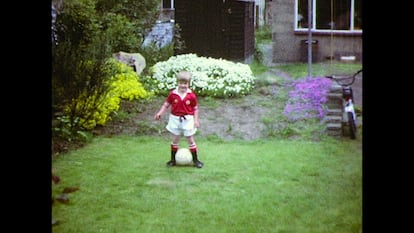
The first episode, full of photographs of little Beckham on and off the field (almost always with a ball at his feet), focuses on how, for him, becoming a soccer legend was not a matter of luck. “His dream was to have a son that played for Manchester United,” he says about his father. In fact, his middle name is Robert, after the soccer player Robert “Bobby” Charlton. His father also admits that he was harsh when David was a kid, but adds that it “turned out to be the right thing.” He was not one of those parents that encourage their children even when they fail; he made him repeat the corner kicks over and over again. His logic was: if he told him he was good, then he would have stopped trying. In fact, concerned about little David’s height, there was a time when he gave him a Guinness beer and a raw egg every week to help him grow. Today he is a proud dad who treasures his 1,400 videos of his son playing.
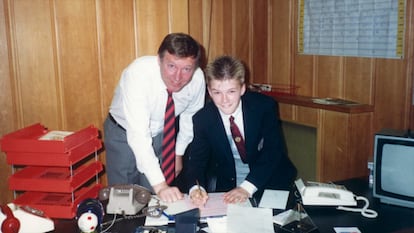
His whims
When you grow up in a humble family and start making money, two things can happen: you might save it, or you might spend it on whims. David Beckham’s case is the latter. “I signed a contract with Adidas for £50,000 and I went and bought an [BMW] M3 – for £50,000,” recalls one of the first soccer players ever to sign contracts with brands, back in the 1990s. He liked to buy the best cars, the best watches. “David used to get his salary on a Friday, spend it on a Saturday, and then spend the next five days waiting for his next salary to get the jeans to match,” says his former Manchester teammate Phil Neville.
His current whims include his bees, LEGO bricks and the house he bought in the countryside, where he likes to go on walks. Judging by what is seen in the last episode, it may also be his closet – or, rather, closets: he has one for t-shirts, shirts, sweaters and jackets, another for suits and a third one for pants. All this, and a clothing rack where he prepares all his looks for the week, too.
His love story
David Beckham saw Victoria (then Adams) on television, and right then he said he was going to marry her. At least that is how Gary Neville remembers it. They met shortly after at Manchester United’s stadium and began a relationship that they managed to keep secret for about three months. At first, he recalls, they met in parking lots to avoid being discovered. Their first kiss took place in a parking lot, in his BMW. When their relationship became public, they aroused so much interest that two of the paparazzi who used to follow them everywhere (and who today claim that they would not act as they did back then) even speak in the documentary on several occasions.
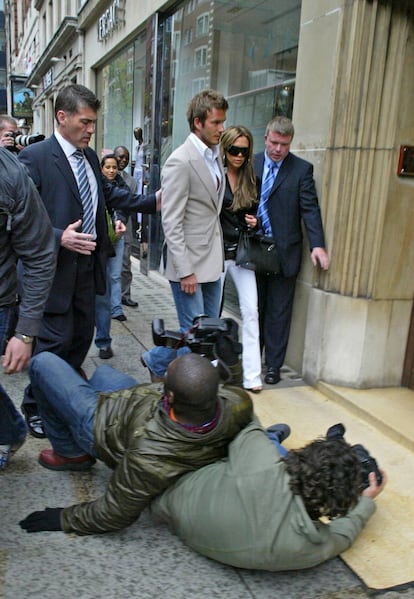
“Football came first, and all of a sudden it wasn’t,” his mother remembers about her son’s then new partner. They both spent hours talking on the phone. “I didn’t care when I saw her, how much I saw her,” he recalls. “If it was me driving down to London to see her for seven minutes, I did it.” In fact, Sir Alex Ferguson, his coach at the time (and whom Beckham considers a second father) thought that she was a distraction that was going to ruin his career.
Their happy ending is history: OK! Magazine paid £1 million ($1.6 million at the time) for the exclusive rights to their wedding, held on July 4, 1999 at Luttrellstown Castle. A video shows him nervously getting dressed (he admits to the camera having gone to the bathroom about 50 times). She wore a Vera Wang dress then valued at $100,000. “What were we thinking?” he says about the two matching purple outfits they wore afterwards. As for the thrones they sat on during the reception, Victoria claims to have no idea where they came from. Their honeymoon was cut short; while they were at Andrew Lloyd Webber’s house in the south of France, the coach called him because he had to go train.
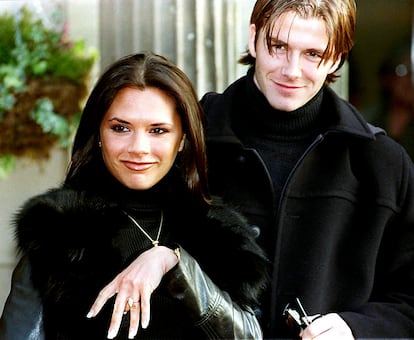
Their first child, Brooklyn, had already been born before their luxurious wedding, and the documentary reveals a fact that could have been decisive in his career. Victoria called him to tell him that she was pregnant the day before a match between England and Argentina in the France 1998 World Cup; a match in which he was sent off for kicking Diego Simeone, a red card that made him the most hated man in his country when the national team lost and was eliminated (even the coach, Glenn Hoddle, publicly blamed him for the defeat).
His worst moment
Victoria says that her husband was “clinically depressed” due to all the attacks from the press and the fans after his performance at the World Cup. The daily harassment included spitting and people shaking his car; even an effigy with his name hanging outside a pub. Someone sent a letter with a bullet to the Manchester headquarters. “I wasn’t eating. I wasn’t sleeping. It took a toll on me that I never even knew myself,” he says. Still, he never publicly denounced it or talked about how he felt; in the late 1990s, a person’s mental health problems were kept hidden. Even more if you were world famous. Diego Simeone also appears in the series, explaining that, for him, that foul did not deserve a red card. One cannot help but think that his rival’s life would have been quite different had he said so at the time.
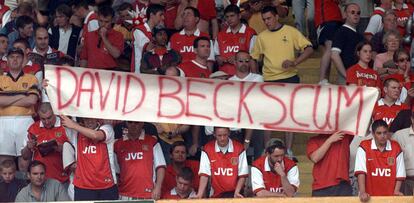
His parents’ anger over how their son was being treated was such that during one of their trips to accompany him to a game they charged their dinner to the room of a reporter from The Sun, recalls Bekham’s mother, adding a touch of humor to one of the hardest stages of her son’s life. Meanwhile, he explains that he felt the constant need to do something to correct what happened. Eventually he did and, as so often happens in sports, the same people who vilified him turned him into a national hero again when he scored a decisive goal against Greece in the 2002 World Cup. If he shaved his head, the children shaved theirs. If he got a mohawk, the children followed suit.
Victoria Beckham never said that Spain smelled like garlic
“When I first moved to Spain, it was difficult because I had been part of a club and a family for my whole career, from the age of 15 to when I was 27. I was sold overnight. The next minute I’m in a city where I didn’t speak the language. More importantly, I didn’t have my family,” he remembers, regarding his signing for Real Madrid in June 2003.
Victoria Beckham was not happy in the Spanish capital, and she tells it in detail. “We had a family we had to think about. I had two children, Brooklyn and Romeo, and this is what nobody seemed to take into consideration, when I was getting criticized for not being in Spain from the beginning. A kid has to go to school. I knew I couldn’t move until I had a school for Brooklyn. But everything was fabricated, taken out of context. It was never about Spain,” says the designer. Things got worse due to pressure from the paparazzi after the first reports of her husband’s alleged infidelity were published. “It was a nightmare. From the minute we opened the door in the morning, the press were there in cars and everywhere we went, we would get followed,” she says. “It was an absolute circus.”
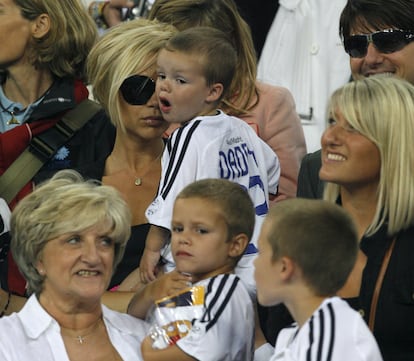
“There were some horrible stories which were difficult to deal with. It was the first time that me and Victoria had been put under that kind of pressure in our marriage,” he recalls. When asked if that was the most difficult moment of her marriage, Victoria replies: “It was the hardest period for us. Because it felt like the world was against us. And here’s the thing; we were against each other, if I’m being completely honest. You know, up until Madrid sometimes it felt like us against everybody else. But we were together. We were connected. We had each other. But when we were in Spain, it didn’t really feel like we had each other either. And that’s sad. I can’t even begin to tell you how hard it was and how it affected me.” He adds: “Every time we woke up, we felt there was something else. And I think we both felt at the time that we were not losing each other but drowning. Victoria’s everything to me. To see her hurt was incredibly difficult. But we’re fighters. And at that time we needed to fight for each other, we needed to fight for our family. And what we had was worth fighting for. But ultimately, it’s our private life.” Perhaps the documentary does not delve deeper into this matter or even mention the name of the personal assistant with whom he had the alleged affair (Rebecca Loos, how could we forget), because it is co-produced by Studio 99 and — surprise, surprise — David Beckham is one of its owners.
“I was so relieved to be going from such a tricky situation in Spain. [Los Angeles] was a place where everything was just so much easier. Easier to find a house, easier to find a school. You don’t have a language barrier. And so for me, it was all my dreams come true,” says Victoria of her departure to the Californian city after David signed with the Los Angeles Galaxy. And no, she assures, she never said that she hated Spain because it smells like garlic, even if the Spanish edition of Vogue claimed that she did at the time.
Other revelations
Another of David Beckham’s hobbies, aside from honey, is LEGO; one of his obsessions is cleanliness and order, something that is evident at various times. “When everyone is in bed, I go around the house, clean the used candles, turn on the switches so they are properly aligned and make sure everything is tidy,” he explains. A fixation that follows him all the way to his closet (where he stacks his shirts by color and diagonally, so he can see them all) and the barbecue area of his country house, which he cleans alone after a gathering with the family. That is the only time his children appear in the series. His daughter-in-law Nicola Peltz — the wife of his first-born son — appears in the background, somewhat out of focus, and Romeo is not present at that meal either. However, he does appear at the end of the documentary, playing soccer with his father, in his house’s field. Then history repeats itself: Beckham makes him — the only one of his four children who seems to have the slightest intention of following in his footsteps — throw the ball again and again.
“I probably didn’t realize half of what I talked about until I sort of started this, what should we call it? This therapy? I feel at peace with a lot of what maybe in our first session was still a lot of pent up anger, frustration. I understand it now,” says Victoria Beckham at the end. Therapy is also the word of choice for the main protagonist: “[This] has been some form of therapy.” His conclusion? That nothing is more important than his family. They have been married for 24 years, and counting.
Sign up for our weekly newsletter to get more English-language news coverage from EL PAÍS USA Edition
Tu suscripción se está usando en otro dispositivo
¿Quieres añadir otro usuario a tu suscripción?
Si continúas leyendo en este dispositivo, no se podrá leer en el otro.
FlechaTu suscripción se está usando en otro dispositivo y solo puedes acceder a EL PAÍS desde un dispositivo a la vez.
Si quieres compartir tu cuenta, cambia tu suscripción a la modalidad Premium, así podrás añadir otro usuario. Cada uno accederá con su propia cuenta de email, lo que os permitirá personalizar vuestra experiencia en EL PAÍS.
¿Tienes una suscripción de empresa? Accede aquí para contratar más cuentas.
En el caso de no saber quién está usando tu cuenta, te recomendamos cambiar tu contraseña aquí.
Si decides continuar compartiendo tu cuenta, este mensaje se mostrará en tu dispositivo y en el de la otra persona que está usando tu cuenta de forma indefinida, afectando a tu experiencia de lectura. Puedes consultar aquí los términos y condiciones de la suscripción digital.









































